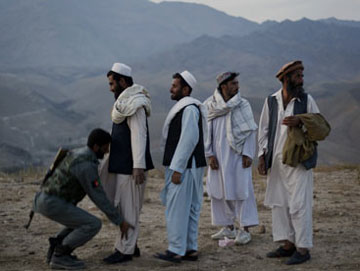Nadene Ghouri

An Afghan National Police officer on a joint NATO stop-and-search operation in Surobi, 30 miles north-east of Kabul. Photograph: Jerome Delay/AP
With his 9mm Smith and Wesson at the ready, the Afghan police chief strode through the bazaar of rickety wooden stalls, grabbed a hapless shopkeeper by the hair and slapped him across the face three times. One officer hit a man in the knees with his rifle butt.
This was an afternoon raid on shops suspected of selling illegal radio equipment used in the making of IEDs (improvised explosive device). Moments later the contents of all the shops was thrown outside in a large heap of "evidence". As the pile grew it was impossible to tell which items had come from which shop.
Some shopkeepers may have been innocent, others guilty of selling equipment to the Taliban. But the police didn't seem too bothered. They simply arrested everyone. Welcome to policing Kabul-style. Brutal, violent and where truth doesn't necessarily matter.
Last year, I spent a month observing the workings of the Afghan police force for a BBC documentary. I followed their raids and went on the beat with them.
Accused of kidnappings, murders, rapes, extortion and trafficking, and now, the murder of five British troops, the ANP is light years away from what Nato calls "a force fit for purpose".
At graduation day at Kabul's police training academy the new recruits certainly look the part. As they goose step (a hangover from Afghanistan's communist past) to an out of tune band, the officers step forward to receive their certificates, salute and shout out: "Afghanistan, I will serve you!"
Many are idealists, young men joining up to make Afghanistan a safer place, and to have what some see as a secure job. Once the ceremony is over and the chai is drunk they will be dispersed to Afghanistan's far-flung provinces, such as Helmand, Kandahar and Badakhshan, and to a dangerous future.
Between 10,000 and 15,000 Afghan police have been killed in the past five years; four times more likely to be killed than their military counterparts, who benefit from better training and equipment. Not surprisingly, recruitment is at an all-time low. Corruption is rife, with senior officers commonly paying a fee to secure promotions. The fee is regarded as an investment because each time a junior officer takes a bribe or steals from the public, the boss gets a cut. The more senior the post, the higher the upfront fee. A regional commander paying $100,000 can expect to pay back his investment in two years.
Ken Deane, former acting head of the Eupol (EU-funded) police mentoring and training mission, said: "There are many fine young men risking their lives to join up and we owe it to them and to the people of Afghanistan to help them find a way through the current mire." A former deputy chief constable for Northern Ireland, Deane believes lessons can be learned.
"The Taliban act much the way the IRA did in the 80s, offering to bring local security to communities. But in much the way that the population of Northern Ireland grew to trust the police as things changed, so the Afghan people will learn the trust the ANP."
Training has noticeably improved and all recruits now get a minimum of three months' instruction at Kabul's national police academy, with senior Afghan officers working alongside newly installed foreign mentors. One of those mentors, speaking on condition of anonymity, said: "Look, it's bloody hard. For a start, the cultural differences are beyond belief. These are men who beat their wives and make their daughters wear a burka. How am I supposed to teach them how to deal nicely with a rape victim? But basic policing, how to handle an arrest, how to put handcuffs on without breaking someone's wrist, how to collate evidence, that's the same wherever in the world you are. And that's the kind of practical thing they need help with."
The ANP's strategic role is still unclear, with new officers expected to burn poppy fields one minute, and deal sensitively with a crime victim the next.
Last month, as a UN guesthouse was attacked by Taliban gunmen, the ANP took 35 minutes to arrive. They took up positions opposite the guesthouse and began firing indiscriminately. UN sources believe two of those killed were hit by friendly fire.
I recently rode with the ANP to the scene of a suicide bombing. Sirens screeching, the truck carrying eight Afghan policemen sped through the streets of Kabul scattering burka-clad women and children as it passed. An old man carrying a basket of chickens got clipped by the vehicle and fell over. None of the officers were concerned enough to stop their vehicle.
When we reached the blast scene, crowds of scavengers had started trying to steal bits of scrap metal from the burned-out vehicles.
The policemen beat them away with wooden sticks. One policeman grabbed a mobile phone from a man's hands and put it in his pocket. When the man tried to complain he was beaten.
With such scenes commonplace and an Afghan populace too scared, and too mistrustful, to ask for the police's help, let alone make a complaint against bad behaviour, it's hard to see how the ANP will be "fit for purpose" anytime soon.
Nadene Ghouri is a freelance journalist who has worked in Afghanistan for the last eight years and directed Kabul Cops for BBC World and PBS Frontline World.



